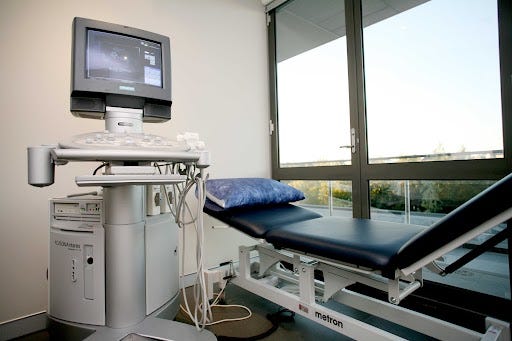
Ultrasound is a very safe and accurate investigative tool used to assess many organs in the body. Ultrasound uses harmless high frequency inaudible sound waves to obtain images. Ultrasound waves are not dangerous to adults or children.
Overview
Synergy Radiology uses the latest imaging ultrasound systems providing enhanced image quality for medical imaging diagnosis in a wide range of areas including abdominal, obstetrics and gynaecology, vascular, musculoskeletal and other soft tissue areas of the body. Our sonographers and specialist radiologists are highly trained and experienced in all facets of ultrasound imaging. We have female radiographers and sonographers sensitive to the needs of female patients.
Preparing for an Ultrasound
Please bring your referral (letter from your doctor) and your Medicare and/or Pension Health care card with you to your appointment. It is important to bring all previous imaging relating to the region being imaged. Please ensure that you are on time for your appointment to ensure there is sufficient time available to perform the procedure.
Depending on the area to be scanned you may be asked to follow special instructions. Continue to take all your usual medications. The preparation may include drinking fluids or fasting before your test. You will be given all the relevant information when making your appointment, but we’ve provided an overview below.
Pelvis, lower abdomen, kidney or bladder ultrasounds require you to have a full bladder. It is necessary to drink 600–800ml of water two hours prior to the scan and refrain from going to the toilet.
Gynaecological and Pregnancy ultrasounds require you to have a full bladder. It is necessary to drink 600–800ml of water two hours prior to the scan and refrain from going to the toilet. In some instances an internal ultrasound is required and is performed with an empty bladder. The sonographer will discuss this option with you.
Upper abdominal ultrasounds such as liver, gallbladder or pancreas require you to fast (i.e. no eating, drinking or smoking for six hours prior to the examination). If you are a diabetic, please discuss this with our bookings staff.
Musculoskeletal ultrasounds (shoulder, arm, elbow, forearm, hand and wrist, hip, thigh, knee, calf, ankle and foot) usually require no special preparation.
We understand that some patients are anxious about having tests performed. If you have any questions or concerns, please do not hesitate to ask our staff.
Scanning
The ultrasound waves are transmitted and collected via a hand held probe which is moved over the part of the body being investigated. You will not feel any pain or discomfort. Your procedure will usually take between 20 and 30 minutes. A highly trained sonographer will conduct the study and a specialist may also participate in the examination.
Results
After the procedure the results will be reported by a specialist.
Results may be provided electronically to your referrer.
Synergy Radiology strongly advises that you return to your practitioner, in order for your doctor to discuss your radiology report with you.
FAQs
Will I be exposed to radiation?
No. Ultrasound is a very safe and accurate investigative tool used to assess many organs in the body. Ultrasound uses harmless high frequency inaudible sound waves to obtain images. Ultrasound waves are not dangerous or irritating to adults or children.
Can the sonographer check other areas I am concerned about?
No. The sonographer is limited to the region your doctor has requested. Please discuss with the sonographer any questions or concerns you may have as they may aid in your diagnosis.
Can I eat before having a pelvic/obstetric ultrasound?
Yes. Eating before your obstetric /gynaecological ultrasound is permitted.
You are required to have a full bladder. It is necessary to drink 600–800ml of water two hours prior to the scan and do not go to the toilet before the scan.
Can I have a female sonographer/technician to perform the scan?
Yes, please let reception know when making your appointment. We have female radiographers and sonographers sensitive to the needs of female patients.
What is the difference between a nuchal translucency scan and an obstetric ultrasound?
There are many reasons why a doctor would refer for an obstetric ultrasound, these can include:
- to assist in determining the gestational age (when the baby is due)
- to assess the growth of a baby
- to assess the number of babies
- to check for possible abnormalities
- to follow-up on any bleeding during the pregnancy
A nuchal translucency scan is an ultrasound usually performed between 11th to 13th week of pregnancy. It is a screening process (ultrasound and blood test) to assess the risk for your baby of certain chromosomal abnormalities, including Down syndrome. For more detailed information please see our page on Nuchal Translucency.
Will the sonographer performing my scan tell me what’s wrong?
It is the sonographer’s duty to perform the test and ensure the images are of high quality for the radiologist (specialist doctor) to interpret them.

More Stories
Snooze Like a Pro: Your Ultimate Guide to Smart Sleep Solutions for Insomnia!
Orthodontist: Your Complete Guide to Straighter Smiles
Kingymab: Unlocking the Potential of Biologic Therapeutics